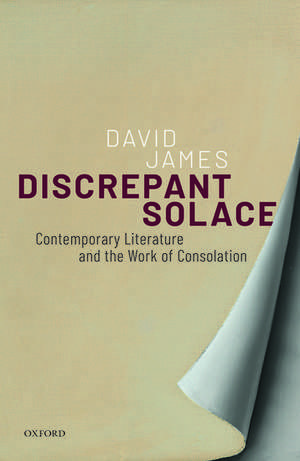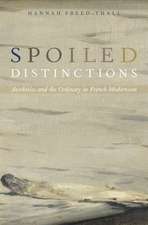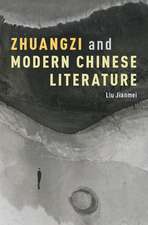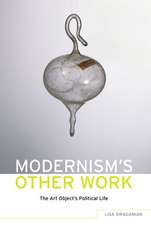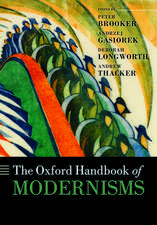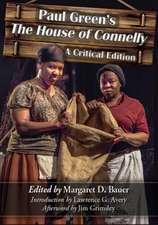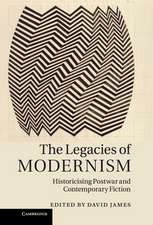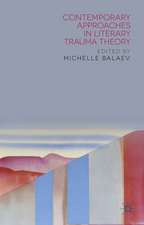Discrepant Solace: Contemporary Literature and the Work of Consolation
Autor David Jamesen Limba Engleză Hardback – 23 mai 2019
Preț: 536.16 lei
Preț vechi: 766.52 lei
-30% Nou
Puncte Express: 804
Preț estimativ în valută:
102.63€ • 111.51$ • 86.26£
102.63€ • 111.51$ • 86.26£
Carte tipărită la comandă
Livrare economică 10-16 aprilie
Preluare comenzi: 021 569.72.76
Specificații
ISBN-13: 9780198789758
ISBN-10: 0198789750
Pagini: 288
Dimensiuni: 160 x 241 x 21 mm
Greutate: 0.64 kg
Editura: OUP OXFORD
Colecția OUP Oxford
Locul publicării:Oxford, United Kingdom
ISBN-10: 0198789750
Pagini: 288
Dimensiuni: 160 x 241 x 21 mm
Greutate: 0.64 kg
Editura: OUP OXFORD
Colecția OUP Oxford
Locul publicării:Oxford, United Kingdom
Recenzii
In the face of illness, grief, trauma, catastrophe -- why write? Can consolation be found in works that seem to be about inconsolability? These are the urgent questions that propel David James' remarkable study of twenty-first century narrative fiction and memoir. The answers that James provides do full justice to the emotional depth as well as the analytic complexity of a body of contemporary writing that ranges from Kazuo Ishiguro to J.M. Coetzee, from W.G. Sebald to Joan Didion, from Marilynne Robinson to David Grossman... This is a book that skillfully and rewardingly attends to the micro-effects of prosody, while forging a new direction for the critical understanding of elegy, grief writing, trauma studies and post-modern fiction.
David James challenges the association of aesthetic consolation with distraction and comfort, showing instead how contemporary literature provides solace through the detailed description of loss and devastation. Discrepant Solace not only analyzes this paradox but instantiates it. In addressing the ethics of representing bleak experience, James has written a work of criticism that is not only intellectually challenging but also beautiful and deeply moving.
To console us is one of the oldest tasks of literature, but it is also, of late, one of the most neglected. Literature should challenge us, estrange us, beguile us, but very few make the case that it should make us feel better. David James' brilliantly subtle and poetically attentive book responds to this critical lacuna, by offering a new way of understanding how today's literature consoles. There is nothing sentimental about this book -- James does not offer a cosy picture of the redemptive qualities of the literary imagination; rather he addresses some of the contemporary writers whose work is most difficult, most uncompromising. But in doing so, he produces a startlingly original way of thinking about how the beauty of style overcomes some of the deprivations it witnesses, an account of the reparations of literary form that will have a transformative effect on how we think about the contemporary novel.
David James challenges the association of aesthetic consolation with distraction and comfort, showing instead how contemporary literature provides solace through the detailed description of loss and devastation. Discrepant Solace not only analyzes this paradox but instantiates it. In addressing the ethics of representing bleak experience, James has written a work of criticism that is not only intellectually challenging but also beautiful and deeply moving.
To console us is one of the oldest tasks of literature, but it is also, of late, one of the most neglected. Literature should challenge us, estrange us, beguile us, but very few make the case that it should make us feel better. David James' brilliantly subtle and poetically attentive book responds to this critical lacuna, by offering a new way of understanding how today's literature consoles. There is nothing sentimental about this book -- James does not offer a cosy picture of the redemptive qualities of the literary imagination; rather he addresses some of the contemporary writers whose work is most difficult, most uncompromising. But in doing so, he produces a startlingly original way of thinking about how the beauty of style overcomes some of the deprivations it witnesses, an account of the reparations of literary form that will have a transformative effect on how we think about the contemporary novel.
Notă biografică
David James is a Professorial Research Fellow at the University of Birmingham, before which he was Reader in Modern and Contemporary Literature at Queen Mary, University of London. Author, most recently, of Modernist Futures (Cambridge University Press, 2012), his edited volumes include The Legacies of Modernism (Cambridge University Press, 2012), The Cambridge Companion to British Fiction since 1945 (Cambridge University Press, 2015), and Modernism and Close Reading (Oxford University Press, forthcoming). He is Associate Editor for the journal Contemporary Literature, and for Columbia University Press he co-edits the book series 'Literature Now'.
